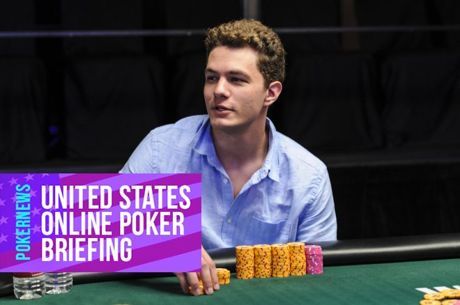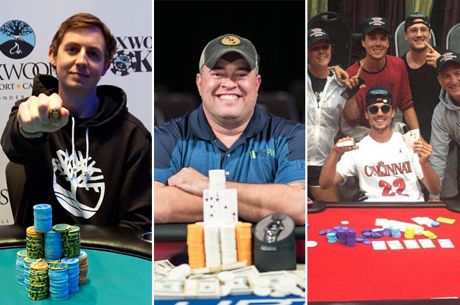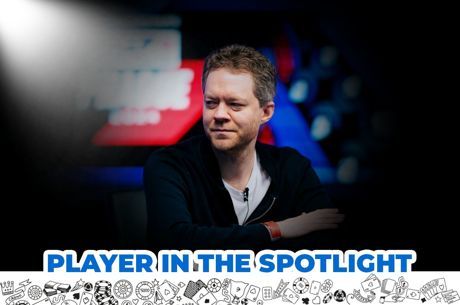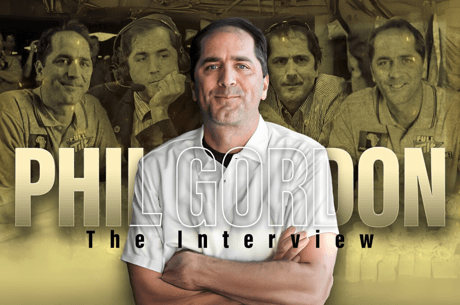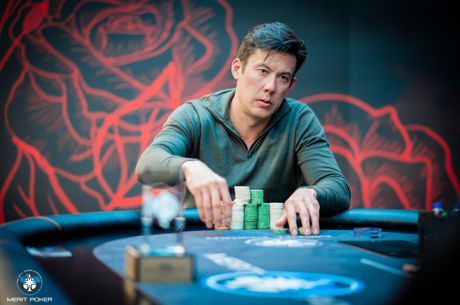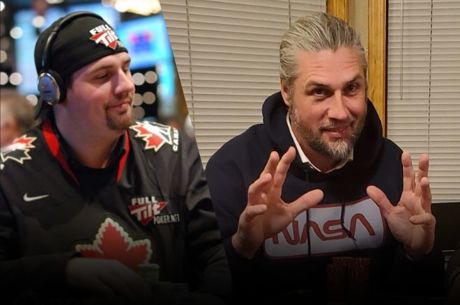Before the Game: Matt Salsberg the TV Writer (Part One)
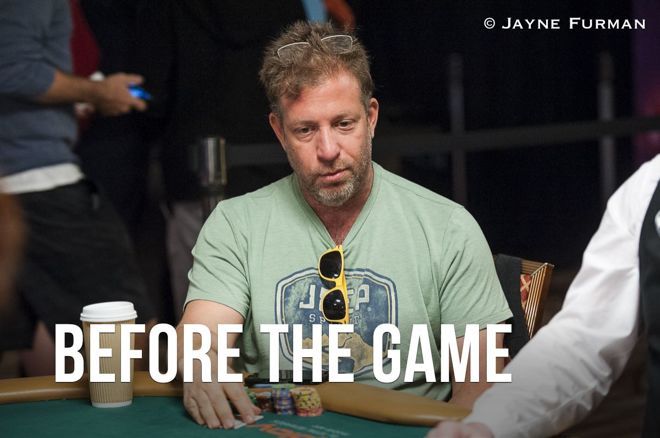
Table Of Contents
You probably know the words used by Matt Salsberg whether you’ve heard him speak or not. For the last 20 years, Salsberg has written for television and helped create shows like "Weeds," "Entourage" and "Kidding." But if you’re a poker fan, you’ll know "Salty" as a former World Poker Tour Player of the Year.
But how did Salsberg go from penning scripts to lifting trophies? This is the story of who Matt Salsberg was... Before the Game.
Non-Fishy Bets
Gambling was an early thread in the young Salsberg’s life as he grew up in Montreal in the 1980s. Salsberg's father and grandfather owned racehorses, and Salsberg frequently found himself at a nearby track, where he learned the culture of gambling. He continued to head to the track throughout his years at college, encountering "nefarious types" and a variety of characters from all walks of life.
Quite apart from what that was teaching him for his future career in writing and poker, he internalized the betting lessons he was taking in. He read racing forms, studied past results, and learned about probability and odds.
"I was always very funny but growing up in Montreal it wasn’t even on the radar that you could be a TV writer."
“You try to make a non-fishy bet and try to spot value," he said.
After college, Salsberg wanted to be a golfer but realized that his dream of playing on the PGA tour wasn’t destined to happen, despite sporting a handicap of just five.
“Ultimately, I didn’t have the genetics for it," he said.
Pressured by his parents, Salsberg took a course in screenwriting called How to Write a Movie in Nine Weeks. Despite a lack of experience, Salsberg proved to be an apt student. His love of TV and movies proved to be the catalyst to get his life moving in the right direction.
“As soon as I sat down, it clicked," he said. "I was always very funny but growing up in Montreal it wasn’t even on the radar that you could be a TV writer. You either went into your parents’ business or became a lawyer or doctor.”
Canadian Tax Law Provides an In
Salsberg had found his true calling, born out of a desire to get his parents off his back. But forcing his way into the "biz" was proving difficult.
“I’d written a couple of movies during the course, but both of them were rejected by everyone I sent them to," Salsberg said. "Movie writing was a 7,000-to-1 shot."
TV, however, offered a potential opportunity. TV shows typically had staffs of writers and often hired up-and-comers to be a part of the team.
Salsberg wrote a "Seinfeld" spec script and got good feedback. He felt it was an area in which he could break through, and his efforts to find a professional writing credit bore fruit from serendipitous circumstances.
"Movie writing was a 7,000-to-1 shot."
Turns out, an American show filming locally in Montreal needed a writer or director who was Canadian to satisfy local tax credit requirements.
Salsberg was that writer, and the show was "The Mystery Files of Shelby Woo." The series was about a young Asian girl who solves mysteries with the help of her grandpa.
The episode Salsberg wrote? "The Racetrack Mystery." Of course, he wrote it with his childhood haunt in mind, which was exactly where it wound up being filmed.
Salsberg thought he had arrived as a television writer. But if he thought that ride was going to go smoothly, he was wrong.
"I was very excited," Salsberg said. "I was broke at the time. But the series got cancelled, so it was back to the pavement and it wasn’t the big break in my career.”
That would come courtesy of a chance meeting at 30,000 feet that Salsberg knew nothing about.
A Diamond in the 'Weeds'
There were a few degrees of separation involved, but a friend of Salsberg's mother took a flight to Israel and sat next to Jenji Kohan, a TV writer. The friend got Kohan's phone number and passed it along.
Salsberg called Kohan and they got on well. She worked on series like "The Fresh Prince of Bel-Air" and "Boston Common." They arranged to meet in L.A. one day.
Instead, plans fell through, but the intervening years were still good to Salsberg as he built a portfolio. Then, chance would see the two reconnect in 2003.
"I’d written on around five shows that got cancelled before Weeds, and it was great when that hit because I finally had stability.”
Salsberg went to a meeting to join a writing team for "The Stones." Turned out, Kohan had written the pilot for it. Despite having a higher-paying offer on the table for a different show, Salsberg rolled with "The Stones" because he "vibed with Jenji in the meeting."
After discussing the show, Salsberg was hired. Having been brought on board, he told her the story of their former near-meeting.
“After that, we were always close," he said. "We worked together on 'The Stones' and then when 'Weeds' got picked up."

On to "Weeds." Writing and co-producing the comedy, about a single mother who becomes a big-time marijuana dealer, would prove to be the defining moment of Salsberg's career. It ran for eight seasons from 2005 to 2012 and was met with both critical and audience acclaim.
“We didn’t know if anyone would like 'Weeds,'" Salsberg confessed. "It was on Showtime, it was about marijuana, and we were operating in a vacuum. Then it came out, the reviews were good, and people liked it.
“It’s like hitting a rush in poker. You’re taking bad beat after bad beat, and that was happening with my writing career. I’d written on around five shows that got cancelled before Weeds, and it was great when that hit because I finally had stability.”
Meet the Pros
With Weeds a critical and commercial hit, Salsberg revived his love of cards. He started playing in the aftermath of Moneymaker’s poker boom victory at the World Series of Poker between the periods of writing shows.
“I caught the poker bug, but I never dared to play anything too high stakes because I didn’t want to be irresponsible," Salsberg said. "I wanted to win my way into high stakes tournaments. I was pretty good, but I never tested my skill set in bigger tournaments. I’d go to the World Series, but I’d play a $1,500, and never the Main Event.”
In 2010, Salsberg had a chance to fulfill a bit of a secret mission that combined poker and drama in equal measure.
“Mike Matusow said a bunch of disparaging things to me, not knowing who I was."
He was asked if he wanted to take part in a Full Tilt Poker commercial as an extra. The timing was perfect as Salsberg was working on an idea for a show centered around poker, so it would double as a networking and research opportunity.
There, he met some of the biggest names behind the worldwide brand — Chris Ferguson ("cagey"), Allen Cunningham ("nice guy"), and others like Gus Hansen and John Juanda.
"These guys were raking it in and I wanted to see what they were all about," Salsberg said.
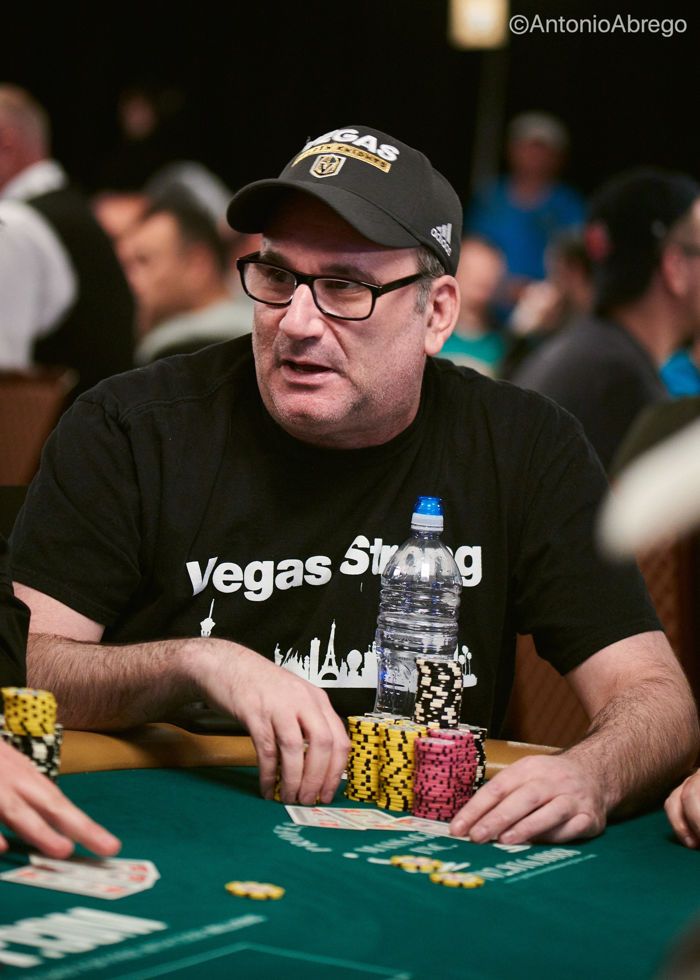
It was Mike Matusow, though, who left the biggest impression.
“Mike Matusow said a bunch of disparaging things to me, not knowing who I was," Salsberg recalls. "I’m there, I say, ‘Let’s play a little poker, guys,’ and he just said to me, ‘Man, you don’t have the kind of money to play for the stakes we play, buddy.’
"It was so condescending, it was awesome.”
Salsberg chuckled to himself. When the FTP scandal hit after Black Friday in 2011, Salsberg was one person who wasn’t altogether surprised.
“I was very suspicious that they were potentially cheating," he said. "Obviously, the Ultimate Bet scandal had happened, there was insane cheating with Russ Hamilton and the hole cards. Full Tilt were neglectful in cashing out dividends for player reserves. We’ll never know, but those guys weren’t choirboys.”
“I was very suspicious that they were potentially cheating."
Salsberg remains convinced of Full Tilt Poker’s guilt all these years later, condemning Ferguson's apology in 2018 as "more of a ‘f*** you’ than an apology."
His idea for a poker show, at least, was gathering some momentum. Little did Salsberg know that he was about to get all the research he would ever need.
Find out what happened next to the TV writer in Part Two of Before the Game.
"Weeds" logo courtesy of Wikimedia Commons
In this Series
- 1 Before the Game: Sam Razavi the Stage Performer
- 2 Before the Game: Steve Watts the Professional Football Player
- 3 Before the Game: Roberto Romanello the Restaurant Worker (Part One)
- 4 Before the Game: Roberto Romanello (Part Two)
- 5 Before the Game: Mike Sexton the Paratrooper (Part One)
- 6 Before the Game: Mike Sexton (Part Two)
- 7 Neil Channing - Before the Game (Part One)
- 8 Neil Channing - Before the Game (Part Two)
- 9 Before the Game: Erik Seidel the Trader (Part One)
- 10 Before the Game: Erik Seidel the Trader (Part Two)
- 11 Before the Game: Sorel Mizzi the Young Army Reservist (Part One)
- 12 Before the Game: Sorel Mizzi the Telemarketer (Part Two)
- 13 Before the Game: Sam Trickett the Footballer (Part One)
- 14 Before the Game: Sam Trickett (Part Two)
- 15 Before the Game: Bryn Kenney the Magic Player (Part One)
- 16 Before the Game: Bryn Kenney (Part Two)
- 17 Before the Game: Toby Lewis the Sports Nut (Part One)
- 18 Before the Game: Toby Lewis the Sports Nut (Part Two)
- 19 Before the Game: Matt Salsberg the TV Writer (Part One)
- 20 Matt Salsberg: Before the Game (Part Two)
- 21 Before the Game: Jeff Gross the College Soccer Star (Part One)
- 22 Before the Game: Jeff Gross (Part Two)
- 23 Before the Game: Martin Jacobson the Chef (Part One)
- 24 Before the Game: Martin Jacobson the Chef (Part Two)
- 25 Before the Game: Scott Davies the Lawyer
- 26 Before the Game: Chris Moorman the Business Student (Part One)
- 27 Before the Game: Chris Moorman The College Dropout (Part Two)
- 28 Before the Game: Padraig Parkinson the Carnival Host (Part One)
- 29 Before the Game: Padraig Parkinson the Carnival Host (Part Two)



